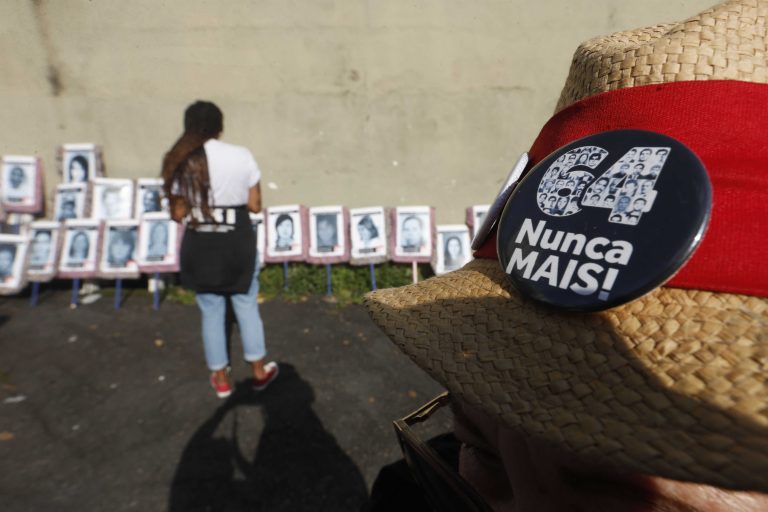The memorial march led to the memorial for the dead and disappeared of the dictatorship in Ibirapuera Park. Photo: Paulo Pinto/Agência Brasil
(Berlin, 2. April 2024, agencybrazil/npla).- March 31st marked the 60th anniversary of a momentous military coup in Brazil. It marked the beginning of a dictatorship that lasted two decades, from 1964 to 1985. The violent overthrow of the then left-wing government of João Goulart was pushed by the Brazilian upper class and supported by US secret services. A truth commission report from 2014 documents hundreds of crimes committed by the authoritarian regime. At least 434 people were victims of murder or enforced disappearance, and thousands more were imprisoned and tortured. Civil liberties were restricted and over 100,000 Brazilians fled into exile.
The process of coming to terms with the military-civilian dictatorship is still being fought over today. The Brazilian right is still celebrating the coup as a “revolution”. The right-wing extremist politician Jair Bolsonaro, President of Brazil until last year, also glorifies the violent regime and continues to mock the victims.
Brazilian right celebrates coup as “revolution”
It is all the more bizarre that his successor, Luiz Inácio Lula da Silva, describes all government measures in (Spanish: Cultura de la memoria), which refers to the expression that the past finds in collective memory. It is fed by traditional evidence of history, media, documents, objects, publications or stories that "Otherness" make the story understandable. It describes the conscious memory, the visualization and the use of history in the current social context. The questions are: How do individuals, society or the state deal with historical events and people? How does history shape their self-image, sense of responsibility and thus their actions? In Latin America, debates about collective memory and coming to terms with it are closely linked to questions of justice and justice ("memory and justice").
” href=” data-gt-translate-attributes=”[{” attribute=”” tabindex=”0″ role=”link”>Gedenken an die Opfer des Putsches untersagen ließ. Die Stimmung zwischen Regierung und Streitkräften solle nicht unnötig angeheizt werden, so der Präsident. Mindestens sieben seiner Minister*innen übten jedoch zivilen Ungehorsam und verurteilten die Militärdiktaturen (spanisch: dictaduras militares) haben im späten 20. Jahrhundert fast alle lateinamerikanischen Länder erlebt. Meist mit einem Putsch beginnend, kamen kleine Eliten aus dem Spektrum des Militärs an die Macht. Sie agierten skrupellos und mit ultrarechter, konservativer, rassistischer und fast immer auch christlicher Gesinnung. Ihr Handeln rechtfertigten die Juntas mit der vermeidlichen Existenz von "inneren Feinden" die die "nationale Sicherheit" des Landes bedrohten. Das bedeutete Repression gegen alle Andersdenkenden, staatliche Kontrolle und eine sogenannte "Nationale Neuorganisation" durch außergesetzliche, exzessive Gewalt (Guerra Sucia und Desaparecidos).
” href=” data-gt-translate-attributes=”[{” attribute=”” tabindex=”0″ role=”link”>Militärdiktatur in sozialen Netzwerken.
Auch in der brasilianischen Metropole São Paulo fand eine große Demonstration unter dem Motto „Damit wir nicht vergessen, damit es nicht weiter passiert“ statt. Die bereits 4. Auflage des Marsches führte zum Denkmal zu Ehren der politischen Toten und Verschwundenen im Ibirapuera-Park.
An der Veranstaltung am Sonntag, 31. März, nahm auch die bekannte Bundesabgeordnete Luiza Erundina der linken Partei PSOL teil. Für die fast 90-jährige Erundina ist die Erinnerung an den 60. Jahrestag des Putsches wichtig, damit die Bevölkerung „nie vergisst, was die Brasilianer durchgemacht haben“. Ihrer Meinung nach hat Brasilien noch immer keine Wiedergutmachung oder Gerechtigkeit für die Geschehnisse in dieser Zeit geleistet. „Wir werden nicht vergessen, was passiert ist und den neuen Generationen die Realität von damals nahe bringen, damit auch sie uns helfen können, diesen Kampf fortzusetzen,“ sagt vor der versammelten Menge. „Wir können nicht zulassen, dass die Verbrechen der Diktatur ungestraft bleiben. Solange diese nicht aufgeklärt sind, wird die Diktatur nicht enden.“
Erinnerung an Militärputsch vor 60 Jahren von Nachrichtenpool Lateinamerika ist lizenziert unter Creative Commons Namensnennung-Weitergabe unter gleichen Bedingungen 4.0 international.
